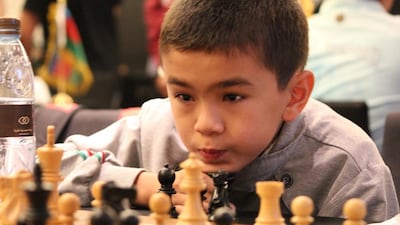ABU DHABI // Javokhir Sindarov is shy. He did not want to speak at all, making the kind of face children do when you tell them they have to eat broccoli.
That is not a surprise.
Sindarov is age nine and he would rather eat broccoli than speak to a journalist about what he does so well. Sindarov, from Uzbekistan, was one of the attractions at the 22nd Abu Dhabi International Chess Festival.
He was overshadowed a little by another Uzbek prodigy at the festival, Nodirbek Abdusattorov, 10, who could well become the youngest grandmaster in the history of the game (and has already defeated a couple of grandmasters).
Sindarov is no less a bona-fide prodigy himself. One blog, Chess by the Numbers, has ranked him sixth in an all-time list of the highest ratings of players under 10.
That was earlier this month, soon after he had won the prestigious Asian Youth Chess Championships in the same age group.
Read more:
– Abu Dhabi Chess Festival will attract a record 165 Grand Masters to the capital
– Emirati chess master crowned Asian Continental champion
About the only thing Sindarov would say – and he did not say it but waved his hand to show it – was that he has been playing chess for five years. Last year, he too beat some grandmasters.
His grandfather accompanied him in Abu Dhabi, stern and proud and always watching over Sindarov’s games.
Chess is increasingly known for its prodigies. It is a huge part of its charm and one of the ways it registers on the sporting mainstream: when a boy of 12 becomes a grandmaster, for instance, or a 14 year old wins the US Open. (Both true stories).
Garry Kasparov, one of the greatest players the game has known, wrote that the growth of sophisticated and powerful chess software means the best players are younger and younger.
Where it used to take years and years to absorb and understand opening moves and other patterns, Kasparov wrote, “Today’s teens, and increasingly pre-teens, can accelerate this process by plugging into a digitised archive of chess information and making full use of the superiority of the young mind to retain it all.”
Chocolate helps, too, at least if the debris of Sindarov’s tables are anything to go by. Still it boggles the mind that someone so young can be so proficient at a game so vast: it has been noted by the writer Diego Rasskin-Gutman that there are more possible chess games (emanating from each move) than there are atoms in the universe.
It was, in fact, noticeable how young so many of the participants in the masters category of the Festival, the most competitive and prestigious, were.
Many competitors were seen adopting the classic chess stance, if there can be such a thing.
Head down, both hands pressed against the forehead, deep in thought and absolutely still.
But some, like Sindarov, had much youthful energy to burn, walking around, casting an eye on other games as they waited for their own opponents to make a move. Empty cans of energy drinks made for an incongruous presence.
Sindarov could not stop tapping his feet and when he got particularly excited about a move, he would make it and immediately stand up.
On one table on Sunday night, the impetuosities of youth even led to a little aggravation.
A game between Derakhshani Bora, from Iran, and Ayyad Husain, from Bahrain, had somehow escalated to a level where both had only pawns and the king left.
With a draw inevitable, the pair was soon stuck in a strange rut of moving their respective kings back and forth between the same positions.
Each time one did, the other would shake their head derisively or tut-tut.
There was even a bizarre finger gesture, presumably to convey irritation, to which the response was a bewildered smile.
It said: “What is he doing?”
Neither said anything to the other because to make a sound in chess is to sin.
This was a battle in mime, ended only when an official was sought to arbitrate and the match declared a draw.
Clearly confrontations in chess conduct themselves a little differently from those in most other sports.
It attracted a small group of onlookers, though much of their attention was also on the progress of Sindarov on the adjacent table.
It was a little unsettling, though, not as much as walking into a hall with so many people hunched over in silence and not engrossed in a smartphone.
osamiuddin@thenational.ae
Follow us on Twitter at NatSportUAE

